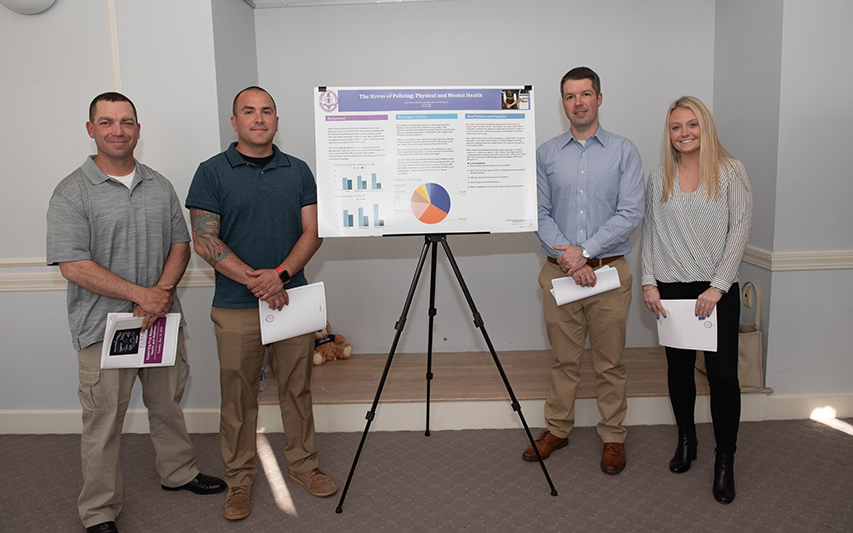
TOPICS:
Two cohorts of the Master of Arts in Criminal Justice (MACJ) program presented their capstone projects in a poster session focused on the theme of “Supporting First Responder Health and Wellness” on Tuesday, May 10.
The Capstone project is a signature culminating academic event that challenges students to carry out community-based projects applying their new advanced knowledge and skill.
View photos from the 2022 MACJ Capstone Presentations
Twenty graduate students, from both the Milton campus and Plymouth campus, worked in small groups to explore the different facets of mental and physical wellness for law enforcement and other first responders. Topics included suicide prevention programs, police department fitness programs, mental health care after critical incidents, and the overall stress of policing.
“I’m always impressed with the work the students do,” said MACJ Director Dr. Adam Stearn. “This is a culmination of six months of hard work while they juggled their jobs, family life, and the pandemic. I am proud of all of them.”
Terrique Chambers, ’19, MACJ ‘22, a detective with the Boston Police Department (BPD), and Myles Lawton MAJC ‘22, an officer with the BPD, looked at the stigma and perception of mental health among police officers. They conducted phone interviews with police from different sized departments and said they were surprised by some of their findings, specifically some factors that determine whether an officer would or would not seek mental health. For example, gender was a factor. Female police officers interviewed stated they already feel pressure as women to “go above and beyond” to gain respect so they were even more reluctant to show emotion or seek help.
Police officers Gerard Giblin, MACJ ’22, Christopher Bird, MACJ ’22, Andrew Minton, MACJ ’22, and Chad Smith, ’19, MACJ ’22, researched how or if first responder mental health was addressed after critical incidents such as the Boston Marathon bombing and the Sandy Hook Elementary School shooting. Their research showed that mental health awareness and preparation for dealing with such incidents is missing from most police academy trainings and that post-incident support services were lacking or that some mandatory services were ineffective.
Dr. Stearn along with Curry professors Dr. Rebecca Kendall and Dr. Jennifer Balboni hosted the event. Professors Willie Bradley, Stephanie Cappadona, Rebecca Paynich, Jeff Carson, and Art Graziano also helped students prepare for the projects through their coursework.